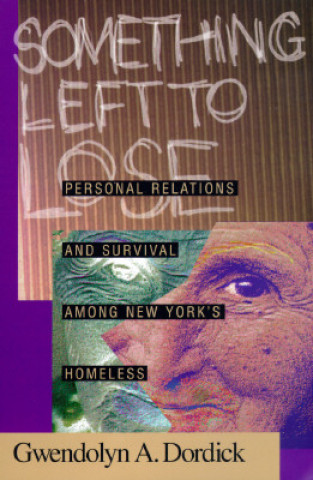
Dostava
Savjetnik za kupnju





Proizvod vam ne odgovara? Nema veze! Možete nam vratiti unutar 30 dana
 Poklon bon
u bilo kojoj vrijednosti
Poklon bon
u bilo kojoj vrijednosti
S poklon bonom ne možete pogriješiti. Za poklon bon primatelj može odabrati bilo što iz naše ponude.
Something Left To Lose
 Engleski
Engleski
 84 b
84 b
30 dana za povrat kupljenih proizvoda
Moglo bi vas zanimati i


Homelessness is usually discussed in terms of its origins or in terms of its amelioration. Media accounts focus on poverty, drug use, lack of shelter, the social safety net, or attempts by the homeless, social service agencies, and government to end homelessness by policy and direct action. Yet we never seem to get a clear picture of who the homeless are. We are exposed to them as a social problem, but we learn little about their daily existence. In "Something Left to Lose", Gwendolyn A. Dordick gives us a dramatic portrait of the social and personal lives of the homeless. Through her extensive 'hanging out' with homeless people, Dordick came to a profound understanding of the web of relationships that provides complex social structure in situations where, to the casual eye, there appears to be only chaos and paralysis. The author shows us that improvising shelter means working hard to co-exist with others.Lacking conventional private dwellings, the homeless find or create shelter in unconventional places on street corners adjoining bus stations, on empty lots of land, or in shelters, public or private and negotiate the rules of these places with authorities, passersbys, and fellow homeless. The different environments lead to quite different social relations. The Armory, for example, is a frightening place, thanks to the authoritarian attitudes of the employees and cliques of homeless people in charge. In the Shanty, on the other hand, the difficult issues are those of a self-governing community concerned about safety controlling the drug use of some residents, deciding who is allowed to tap into the electricity, and worrying about intruders. In all settings, daily life for people without homes, like daily life for people with homes, is full of the concerns of personal relationships.How will we share our goods and emotions, speak respectfully to each other, love and joke and work out our disputes, and act in a trustworthy fashion? This book is also a miniature research odyssey, complete with moments of fear, frustration, blunders, distrust, and trust. In order to gather these interviews, Dordick had to not only win the confidence of the homeless people she visited (the women at the Station thought she was interested in their boyfriends) but also negotiate with unsympathetic police and shelter employees or defy them. Author note: Gwendolyn A. Dordick is Assistant Professor of Sociology at Hamilton College, New York.
Informacije o knjizi
 Engleski
Engleski
Kategorija




 Kako kupovati
Kako kupovati

























